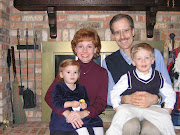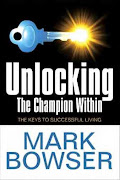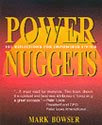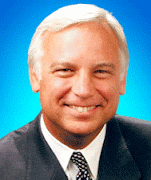By Mark Bowser
In my book, Unlocking the Champion Within, I delve in depth into the topic
of effective communication. That is because our success and failure rests
very closely on how effective you and I can communicate. We can not
"influence" as leaders if we can not communicate effectively. Because it is
so important, I have decided to include that chapter in this book too. Grab
hold of effective communication and you grab hold of your future.
It has been said that public speaking is a fear worse than death for many
people. Well, the truth is that we will not be as successful at selling
unless we improve our communication skills. In this article, we are going
to explore some insights and action steps, which lead to more effective
sales communication. The only way to really conquer a fear is to confront
it and jump right in. With that in mind, let's get started.
1. Realize that communication may be the most important skill we can learn.
We all need to be able to express our thoughts effectively. We are
creatures of relationships. Relationships are very important to us. In
order to make our relationships better we must make our communication
better.
2. Guard our tongues. Sometimes the most important message is the one we
never give. Have you ever said something and then wish you could take it
back? I think all of us have. Controlling our tongues is one of the most
important and most difficult communication challenges. If we all think
before we speak then we will be in a much better place.
3. Decide that communication is a priority. If something is a priority
then what do we usually give it? ANSWER: Time and Commitment.
4. Talk with people not at them. Have you ever been talked DOWN to? How
did it make you feel? How did you feel at that moment about the person
talking to you? Not too good right? We need to talk WITH people. We need
to make our communication conversational and user friendly. We need to ask
ourselves, "How can I uplift this person as I express my thoughts and
opinions?" This will help us communicate our messages in a more
compassionate way. Even if we have to communicate some ugly message,
compassion will see us through.
5. Have an open door policy. We must make time for people. If we lived in
President Lincoln's day and wanted to speak with the president all we would
have to do is walk in the White House and sit outside his door. When he
came out, we would be able to speak with him. We need to do the same thing.
If it worked for the president, it will work for us. If at that moment it
is not appropriate, then make an appointment with the person.
6. Understand what Dale Carnegie & Associates, Inc. believe when they say,
"Communication is built on trusting relationships." (The Leader In You: How
to Win Friends, Influence People, and Succeed in a Changing World by Stuart
R. Levine, CEO, and Michael A. Crom, VP). If people don't trust us, then
why would they listen to us?
7. Prepare, prepare, prepare. A number of years ago, I was trained by an
organization called Speakers USA, Inc. They used to tell us that if we want
a talk/presentation to look impromptu then make sure it is not. In other
words, do your homework and practice, practice, prepare, prepare, prepare.
8. Don't give a public presentation/talk unless you are passionate and
knowledgeable about the topic. If we are not passionate about the topic
then it will come across flat and boring. If we are not knowledgeable about
the topic then our credibility will drop.
9. Make sure your body language, tone of voice, and message are congruent.
Suppose I came up to you and said in a very gruff tone, "Sure, I would love
to have the boss over for dinner!" Do you think I really want the boss to
come over for dinner? You don't think so? Why? ANSWER: Because I wouldn't
be congruent. When we aren't congruent in every way, then we give mixed
messages to our listeners.
10. Have patience. Communication, particularly public communication, is
not easy. Be patient with yourself. You won't become an expert overnight.
Keep practicing and keep improving.
11. Look for the benefit of our differences. We need to constantly remind
ourselves that different doesn't necessarily mean wrong.
12. If agreement cannot be made then agree to disagree. A great way to
keep the peace.
13. Keep your cool when someone improperly states something. They may not
be trying to insult you. Have you ever thought you were being insulted but
were not sure? Instead of reactively attacking back, just wait. They may
have just said something in an awkward fashion. Don't jump to conclusions.
Believe me, if they were actually trying to insult you and they thought you
didn't get it, they will insult you again. And if they were insulting you
then just simply tell them that you don't appreciate it and that you forgive
them.
14. Always try to part on a positive upbeat ending. Nobody likes to leave
with a sour attitude in his/her stomach. Always try to make peace before
you end a conversation.
15. Loyalty many times comes from private conversations. Build trust by
keeping confidences.
16. Use stories to illustrate your points. Jesus Christ always used
stories when He taught the crowds. Abraham Lincoln believed in stories too.
Lincoln said, "They say I tell a great many stories. I reckon I do; but I
have learned from long experience that plain people, take them as they run,
are more easily influenced through the medium of a broad and humorous
illustration than in any other way...." REMEMBER: ALWAYS HAVE A POINT TO
YOUR STORY.
17. Learn to speak off the cuff (extemporaneously). Lincoln said,
"Extemporaneously speaking should be practiced and cultivated...However able
and faithful he may be in other respects, people are slow to bring him
business if he cannot make a speech." One way to practice this is to grab
your local paper and read a few headlines. Practice speaking on those
topics for 1-2 minutes for each topic.
18. Join a Toastmasters club. Toastmasters International are international
speaking clubs designed to help people of all walks of life become more
effective communicators and thus more successful. I was a member of
Toastmasters for years and I really enjoyed and benefited from the
experience. Check your local newspaper and/or library to find the nearest
club to you. If no luck there, then go to the World Wide Web at
www.toastmasters.org. Plan to visit a local club as soon as you can. I
don't think you will regret it.
19. Remember, we don't have to make a long speech in order to be effective.
Just say what needs to be said and then stop talking. I remind you of
Abraham Lincoln's Gettysburg Address.
20. Use Millard Bennett's 30-10 Power Formula. What is the 30-10 Power
Formula? First you read for 30 minutes everyday in whatever area you want
to develop yourself in. This will build up your knowledge base. Of that 30
minutes, read out loud for 10 minutes. Reading out loud will improve your
communication skills. It will improve your pronunciation, voice
inflections, stamina, etc.... Of that 10 minutes, read part of it in a
whisper, maybe a minute or two. Reading in a whisper will eliminate all
those um, ahh, and all those other verbal fillers. This formula is one of
the simplest formulas to practice but one of the most powerful. Try it for
a month and see what you think.
21. Understand that an inspiring talk can change the face of an
organization, nation, family, or an entire world. I remind you of Dr.
Martin Luther King, Jr.'s "I have a dream" speech, JFK's challenge to put a
man on the moon, and Reagan's "Mr. Gorbachov tear down this wall."
I am convinced that if you really practice and work on these 21 steps you
will become a POWER COMMUNICATOR and have greater success in selling. Make
it happen and have fun.
Mark E. Bowser
President/CEO
Empowering Enterprises, Inc.
7723 Tylers Place Blvd. #280
West Chester, OH 45069
(513)252-GOAL
Superior Training, Superior Results!
Check out our Complimentary Success Newsletters at www.MarkBowser.com &
www.TakeActionSales.com
Come follow me on Twitter http://twitter.com/MarkBowser
Connect with me on LinkedIN
http://www.linkedin.com/in/markbowser
Come visit Mark Bowser's blogs www.SalesTrainingToday.blogspot.com &
www.LeadershipStylesToday.blogspot.com




+048.jpg)
+051.jpg)
+031.jpg)



.jpg)
.jpg)


No comments:
Post a Comment